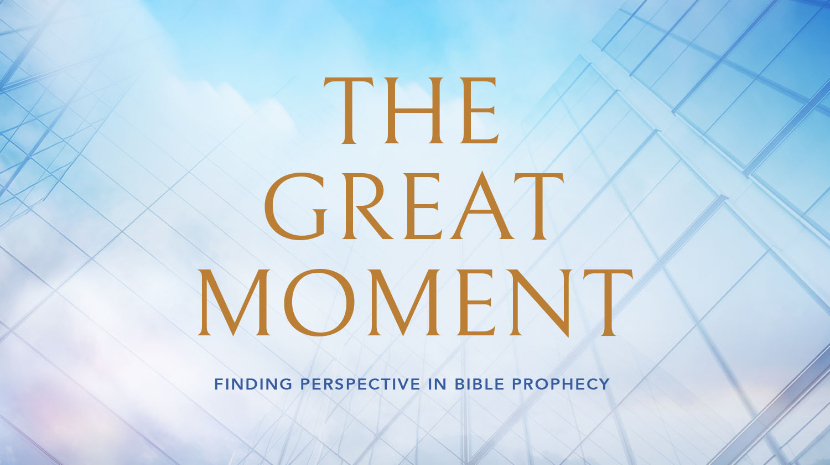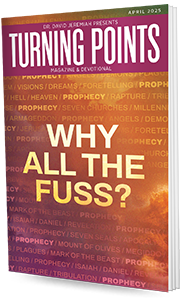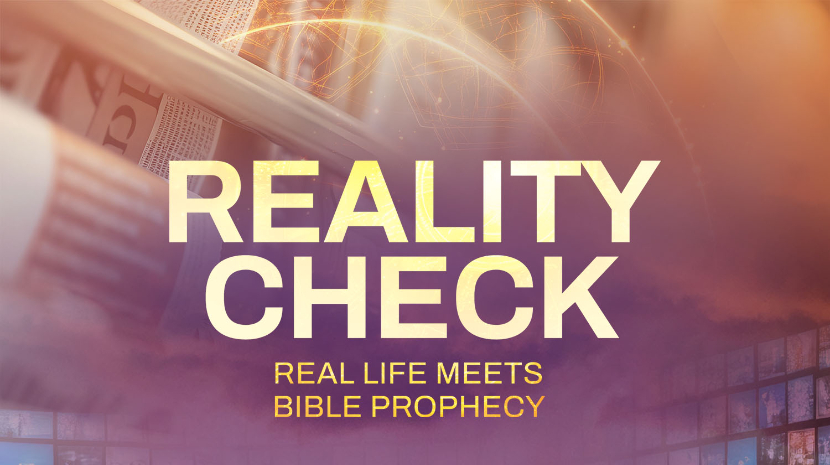From the October 2023 Issue

The Great Moment: Finding Perspective in Bible Prophecy
We’ve all experienced this: New information “comes to light” that changes our plans. That is, it changes the way we live. That’s the basic meaning of the idiom we use all the time, In light of.
In light of today’s weather report, we need to cancel tomorrow’s picnic.
How do we live in light of Jesus’ return?
In light of rising inflation, we need to evaluate our family’s budget.
Or how about this: After Jesus’ resurrection, He and His disciples were gathered together on the Mount of Olives. The disciples were still not totally clear about the chain of events they had witnessed over the last forty days or what the future held. Suddenly, Jesus rose from their midst and ascended into heaven. Two angels appeared and, seemingly noticing the bemused looks on the disciples’ faces, said: “Men of Galilee, why do you stand gazing up into heaven? This same Jesus, who was taken up from you into heaven, will so come in like manner as you saw Him go into heaven” (Acts 1:9-11).
Since Luke, the author of Acts, doesn’t tell us how the disciples responded to the angels’ words, let me take a guess: “Whoa! This changes everything. In light of what the angels said—that Jesus is going to return—we need to rethink our perspectives, our priorities, and our plans for the future.”
Granted, this was not the first indication the disciples had that Jesus would go away and then return. He had stated that fact plainly: “And if I go and prepare a place for you, I will come again and receive you to Myself; that where I am, there you may be also” (John 14:3). But the Ascension was different—they actually saw Jesus leave earth and ascend into the heavens. Thinking long term, they probably wondered, what now? What do we do while we wait for His return?
Be content where you are since the time is short.
The questions the disciples had were no doubt the same as we have today: How do we live in light of Jesus’ return?
Proof
I have a friend who, a few years ago, began keeping a list in the back of his Bible of references to the return of Christ in Acts and the epistles. At last count, his list contained more than 35 verses and passages that refer in some way to the return of Christ. He was looking not just for references to the fact itself but for references of timing and lifestyle in light of the fact.
Perhaps we have gifts and abilities that could be employed in Kingdom work as time and treasure allow.
Think about it: Even in our daily lives, the bigger the “light” (the new information we receive), the bigger our response must be. Big changes require big responses. The first coming of Christ—His life, death, and resurrection—was certainly life-changing for the apostles. But when He said He would return, that required a new level of response. Not knowing when He would return raised the question, what should we be found doing when He appears the second time?
That moment is coming; I believe it is fast approaching. The moment will come when believers will hear the voice of the archangel and the sound of the trumpet of God, and we will be raptured into the presence of Christ (1 Thessalonians 4:16-17). As I explain below, that moment could be today. And that raises the question, how should we then live?
Our perspective determines our priorities; our priorities determine our plans. Life begins with the proper perspective.
Perspective
The most important perspective on the return of the Lord has to do with a word that is often confused with another word: Imminent is often confused with eminent. Do you know the difference?
Imminent means “about to happen”—as in, “The arrival of the guests is imminent,” or “There is no imminent danger from the approaching storm.”
Eminent means “famous or well-respected”—as in, “The professor is an eminent authority in her field,” or “He is one of the sport’s most eminent coaches.”
With regard to the return of the Lord, it is imminent not eminent. That means the Rapture of the Church could happen at any moment. There is nothing on God’s prophetic timetable that must take place before Christ can return for His Church. Jesus Himself said that He didn’t know the “day and hour” of “the coming of the Son of Man”—only the Father alone knows (Matthew 24:36-37). What we do know is that ever since the ascension of Christ we have been in the “last days” (Acts 2:17; Hebrews 1:2; James 5:3)— at the end of which God will consummate His redemptive plans for mankind by His Son’s return as King of kings and Lord of lords.
Imminence means that the Rapture could take place before you finish reading this article—which should say a lot about your priorities.
Priorities
If you are writing a book on America’s Founding Fathers, and you plan to spend two weeks in Philadelphia doing research, you would prioritize who and what to see and read. Your list would start with the most important and end with the least important. Your perspective—unlimited options but limited time—would shape your priorities for research.
The same is true in our Christian life as we live in light of the imminent return of Christ. The apostle Paul wrote an entire chapter (1 Corinthians 7) on how the Christians in Corinth needed to set priorities since “the time is short.... For the form of this world is passing away” (verses 29, 31). He discussed important areas of life—marriage, relationships, social status, material goods—in which the believers might be tempted to invest time and energy in changing. In short, his advice was to be content where you are since the time is short (verses 17, 20, 24, 26).
Don’t focus on changing a world that is passing away. Instead, Paul wrote that we should focus on living “soberly, righteously, and godly in the present age, looking for the blessed hope and glorious appearing of our great God and Savior Jesus Christ” (Titus 2:12-13). Our priorities will always reveal our perspective.
Plans
A weekend list of priorities—a prioritized to-do list—should lead to a plan: yardwork in the morning when it’s cool, reorganize the garage in the afternoon when it’s hot, family outing in the evening.
Shouldn’t we think the same way about our life as we wait for the return of Christ? Consider the three things we all have: time, talent, and treasure. As servants of Christ, we own none of those things; they are all entrusted to us as stewards to be used according to our Master’s desires. Do we have extra time or treasure? Perhaps it could be spent in advancing God’s Kingdom rather than in less important pursuits. Perhaps we have gifts and abilities that could be employed in Kingdom work as time and treasure allow.
The Great Day of Christ’s return is imminent. If we embrace that perspective, it will shape our priorities and result in plans that will impact the world for eternity. Let today be the moment that you take a fresh look at your life so you have no regrets on that Day.
More Articles
This Month's Magazine Resource

Escape the Coming Night
Studying biblical prophecy might seem overwhelming, especially diving into the book of Revelation. But as Dr. David Jeremiah walks you step by step through Revelation, you will uncover the meaning of terms and events and gain a deeper knowledge of Bible prophecy.
Subscribe Now
Each month, read articles and devotionals from Dr. David Jeremiah that will encourage, challenge, and strengthen your walk with the Lord.













 Turning Point for God is a tax-exempt, not-for-profit, religious corporation as defined under Section 501(c)(3) of the Internal Revenue Code. Your donation gift(s) are very much appreciated and may qualify as a charitable deduction for federal income tax purposes.
Turning Point for God is a tax-exempt, not-for-profit, religious corporation as defined under Section 501(c)(3) of the Internal Revenue Code. Your donation gift(s) are very much appreciated and may qualify as a charitable deduction for federal income tax purposes.




